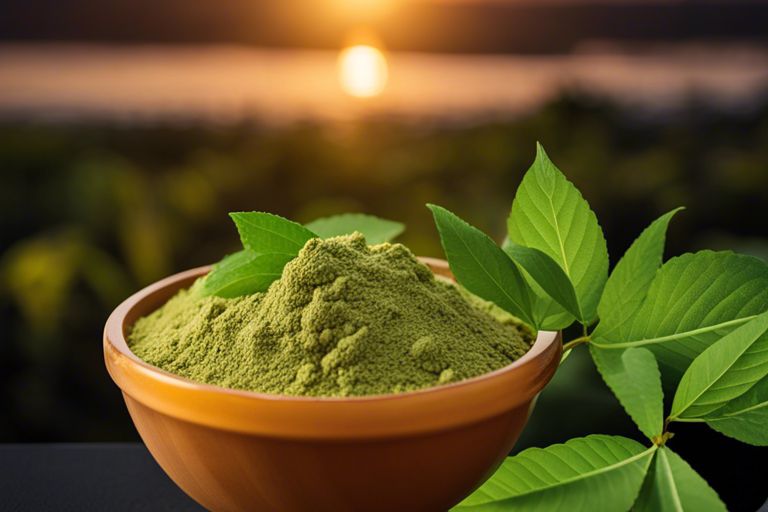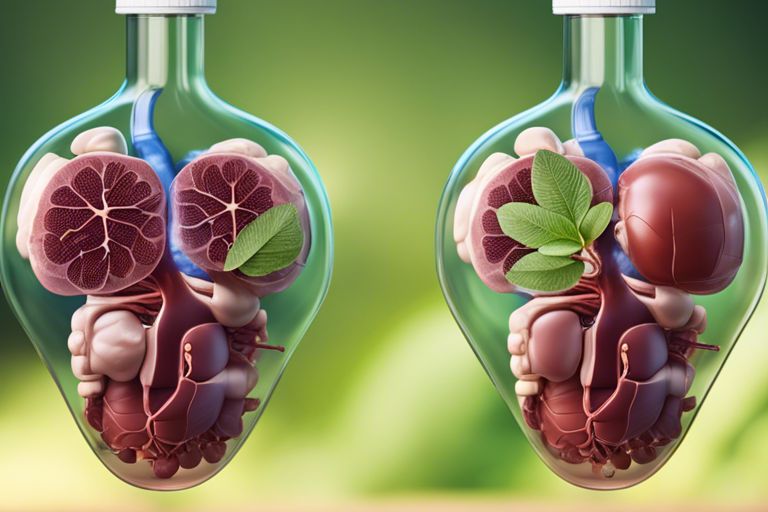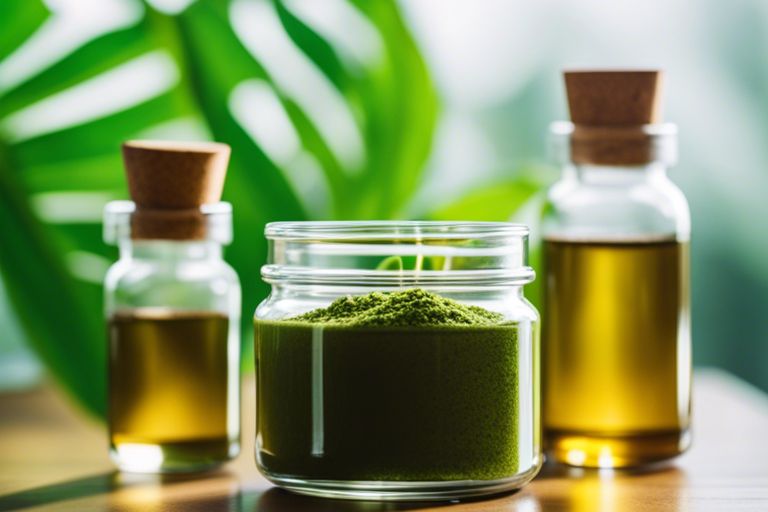Over the years, kratom has gained popularity as a natural remedy for various ailments. However, you may be wondering about its effects on your blood pressure. In this informative blog post, we will investigate into the relationship between kratom consumption and blood pressure levels. By the end, you will have a better understanding of how kratom may impact your blood pressure and what precautions you can take.
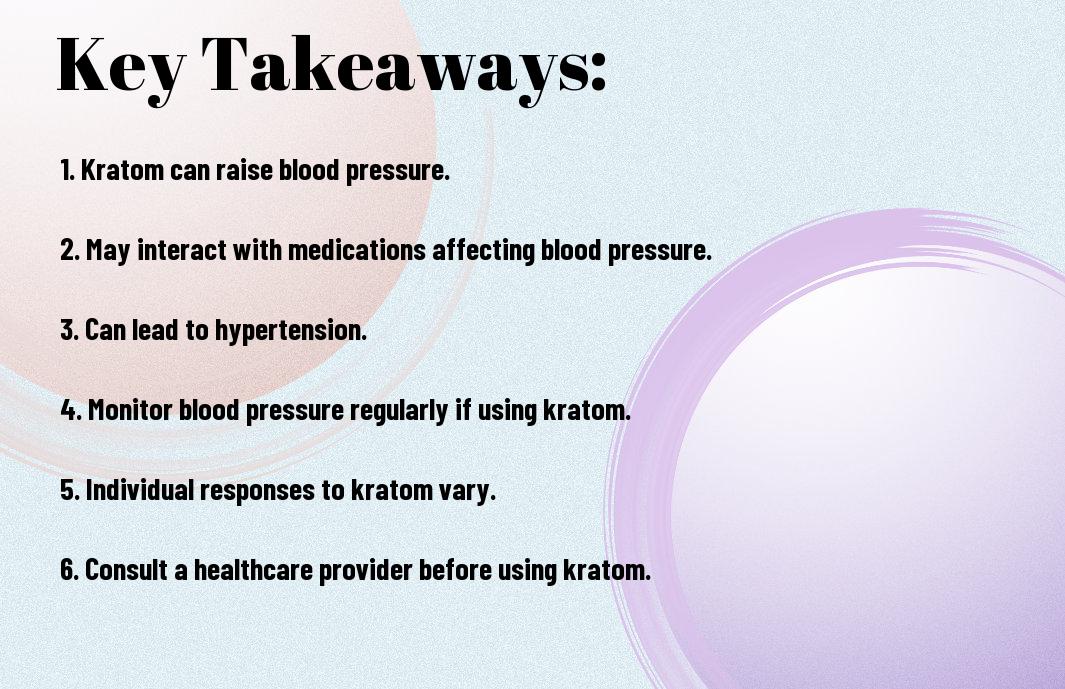
What is Kratom?
While Kratom Fact Sheet for Healthcare Professionals provides detailed information, it’s important for you to understand the basics of what kratom is. Kratom is a tropical tree native to Southeast Asia, particularly Indonesia, Thailand, Malaysia, and Papua New Guinea. The leaves of the kratom tree have been used for centuries for their stimulant and pain-relieving effects.
Origins and History
One interesting fact about kratom is that it has a long history of traditional use by indigenous populations in Southeast Asia. These communities would often chew on the leaves or brew them into a tea to help increase energy levels and alleviate pain. Over time, kratom has gained popularity in Western countries as well, where it is sometimes used as an alternative medicine for chronic pain management and opioid withdrawal.
Chemical Composition
Any discussion about kratom would not be complete without mentioning its chemical composition. The active compounds in kratom are called alkaloids, with two primary ones being mitragynine and 7-hydroxymitragynine. These alkaloids interact with the opioid receptors in your brain, producing effects similar to opioids but with some key differences.
Another aspect of kratom’s chemical makeup worth noting is its classification as a partial opioid agonist. This means that it binds to the same receptors in your brain as opioids but does not produce the same level of respiratory depression, which is the primary cause of overdose deaths associated with traditional opioids. This distinction is what has led some individuals to explore kratom as a potential safer alternative to prescription pain medications.
Blood Pressure Basics
What is Blood Pressure?
Pressure inside your blood vessels is referred to as blood pressure. It is the force that your heart generates to pump blood out into the arteries and throughout your body. Blood pressure is expressed with two numbers: systolic pressure (the top number) and diastolic pressure (the bottom number). Systolic pressure represents the pressure when the heart contracts, while diastolic pressure is the pressure when the heart relaxes between beats.
How is Blood Pressure Regulated?
Pressure regulation in your body is a complex process involving various systems, primarily the autonomic nervous system and the renin-angiotensin-aldosterone system. These systems work together to ensure that your blood pressure remains within a certain range to meet the body’s needs. The autonomic nervous system can increase or decrease heart rate and blood vessel constriction to adjust blood pressure as needed.
Understanding how blood pressure is regulated is crucial because it helps your body maintain homeostasis, ensuring that your organs receive an adequate blood supply without putting too much strain on your cardiovascular system.
Factors Affecting Blood Pressure
- Your lifestyle choices, such as diet, exercise, and stress levels, can significantly impact your blood pressure.
- Genetics and family history also play a role in determining your baseline blood pressure.
For optimal blood pressure levels, it’s crucial to focus on a healthy lifestyle, including a balanced diet, regular exercise, and stress management techniques. The choices you make every day can have a significant impact on your blood pressure levels and overall cardiovascular health.
This understanding underscores the importance of proactive measures to manage and maintain healthy blood pressure, which in turn can reduce your risk of cardiovascular diseases and other related health complications.
The Effects of Kratom on Blood Pressure
Despite its widespread use, there is still much debate over how kratom affects blood pressure. Some studies suggest that kratom can have varying effects on blood pressure depending on the dosage and individual response.
Stimulation and Relaxation
With its unique alkaloids, kratom can have both stimulating and relaxing effects on the body. At lower doses, kratom is known to stimulate the sympathetic nervous system, which can cause a temporary increase in blood pressure. On the other hand, higher doses of kratom tend to have more sedative properties, potentially leading to a decrease in blood pressure.
Vasodilation and Vasoconstriction
Effects of kratom on blood pressure can also be attributed to its ability to cause vasodilation or vasoconstriction. Vasodilation refers to the widening of blood vessels, which can lead to a decrease in blood pressure, while vasoconstriction involves the narrowing of blood vessels, resulting in an increase in blood pressure.
Pressure
The interplay between kratom’s alkaloids and the body’s neurotransmitters like adrenaline and dopamine can have a significant impact on blood pressure regulation. Adrenaline is known to increase heart rate and constrict blood vessels, potentially raising blood pressure. Conversely, dopamine can have a vasodilatory effect, helping to lower blood pressure.
The Role of Adrenaline and Dopamine
Effects of kratom on blood pressure are further influenced by how it interacts with adrenaline and dopamine in your body. Adrenaline, also known as epinephrine, is a hormone that acts as a neurotransmitter, playing a crucial role in the fight-or-flight response. Dopamine, on the other hand, is a neurotransmitter that helps regulate mood, behavior, and cognition.
The Science Behind Kratom’s Impact on Blood Pressure
Now, let’s explore into the scientific mechanisms by which kratom may influence blood pressure. Two key alkaloids found in kratom, mitragynine, and 7-hydroxymitragynine, are believed to play a significant role in its effects on the cardiovascular system.
Mitragynine and 7-Hydroxymitragynine
To understand how kratom affects blood pressure, you must first look at mitragynine and 7-hydroxymitragynine. These alkaloids interact with various receptors in the body, including opioid receptors, which are involved in regulating blood pressure and can lead to changes in cardiovascular function when activated.
Opioid Receptors and Blood Pressure Regulation
Pressure, some studies suggest that the activation of opioid receptors by mitragynine and 7-hydroxymitragynine can impact blood pressure. Opioid receptors are known to modulate the sympathetic nervous system, which plays a crucial role in regulating blood pressure. By influencing these receptors, kratom may indirectly affect blood pressure levels.
Another interesting aspect of how kratom may influence blood pressure is through its interaction with the endocannabinoid system.
The Endocannabinoid System’s Influence
Systems, the endocannabinoid system is another key player in the regulation of cardiovascular function, including blood pressure. Kratom’s alkaloids have been found to interact with cannabinoid receptors in the body, potentially leading to changes in blood pressure. This complex interplay between kratom and the endocannabinoid system further highlights the intricate mechanisms through which kratom may impact blood pressure.
It’s fascinating to see how kratom’s interactions with different biological systems can contribute to its effects on blood pressure regulation. By influencing opioid receptors and the endocannabinoid system, kratom may exert its influence on cardiovascular function, ultimately affecting blood pressure levels.
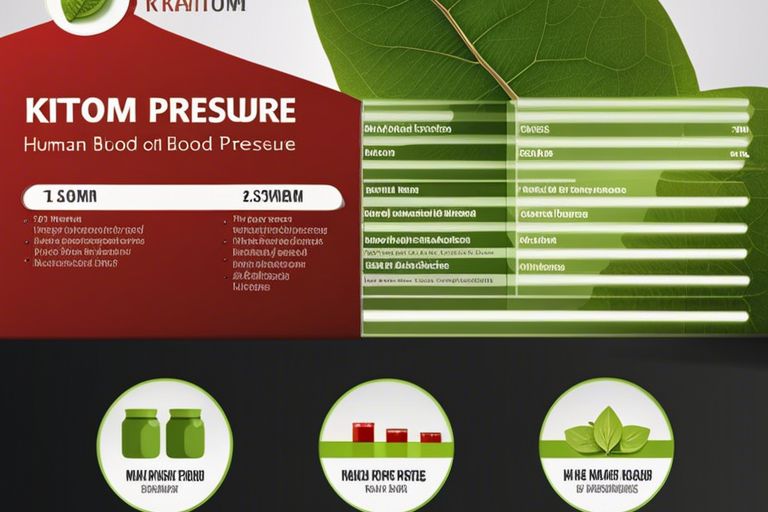
Kratom and Blood Pressure: The Research
Not much is known about the effects of kratom on blood pressure, as research on this subject is still in its early stages. However, several studies have been conducted to investigate the potential relationship between kratom use and blood pressure levels.
Human Studies and Clinical Trials
The research on human subjects regarding kratom’s impact on blood pressure is limited. Some studies suggest that kratom may cause a slight increase in blood pressure, while others have found no significant changes. More research is needed to fully understand how kratom affects blood pressure in human subjects.
Animal Studies and Laboratory Research
Trials conducted on animals and in laboratory settings have provided some insight into the effects of kratom on blood pressure. These studies have shown that kratom can have varying effects on blood pressure, depending on the dosage and strain of kratom used.
However, it is important to note that findings from animal studies may not always directly translate to humans. More research is needed to determine the precise mechanisms by which kratom may influence blood pressure levels in both animals and humans.
Limitations and Future Directions
Human studies on kratom and blood pressure are limited by several factors, including small sample sizes and variations in kratom strains and dosages used. More extensive and well-controlled studies are needed to provide a clearer understanding of how kratom may affect blood pressure in humans.
Any future research should also explore the long-term effects of kratom use on blood pressure and consider other factors, such as individual differences in metabolism and potential interactions with other medications.
Managing Blood Pressure While Using Kratom
Many people may wonder how to effectively manage their blood pressure while using kratom. It is important to monitor your blood pressure regularly, make lifestyle changes, consider taking supplements, and consult with a healthcare professional.
Monitoring Blood Pressure
Pressure measurements should be a regular part of your routine when using kratom. By tracking your blood pressure, you can quickly identify any fluctuations and take necessary steps to keep it within a healthy range.
Lifestyle Changes and Supplements
Using lifestyle changes such as exercising regularly, maintaining a healthy diet, managing stress levels, and taking supplements like magnesium or potassium can help support healthy blood pressure levels. These changes can complement your kratom use and contribute to overall well-being.
When using kratom, it’s vital to take care of your health and consider incorporating these lifestyle changes and supplements to support your blood pressure management.
Consulting a Healthcare Professional
Lifestyle choices and the use of kratom can impact your blood pressure. Consulting a healthcare professional can provide you with tailored advice on how best to manage your blood pressure while taking kratom. They can offer guidance on dosage adjustments, potential interactions with other medications, and overall health monitoring.
The input and guidance from a healthcare professional can be invaluable in helping you navigate the complexities of blood pressure management, especially when using kratom.
The key to effectively managing your blood pressure while using kratom lies in monitoring it regularly, making appropriate lifestyle changes, considering supplements, and seeking advice from a healthcare professional.
Final Words
Considering all points, it’s clear that while kratom may have certain impacts on blood pressure, the evidence is inconclusive and individual responses can vary. If you are someone who already has high or low blood pressure, it’s necessary to monitor how kratom affects you personally. Remember to consult with a healthcare professional before incorporating kratom into your routine, especially if you have any pre-existing medical conditions.
Q: How does kratom affect blood pressure?
A: Kratom can potentially have both stimulating and sedative effects on blood pressure, causing fluctuations in blood pressure levels.
Q: Can kratom raise blood pressure?
A: Yes, kratom has stimulant properties that can lead to an increase in blood pressure levels.
Q: Can kratom lower blood pressure?
A: In some cases, kratom may have a sedative effect that can potentially lower blood pressure levels.
Q: Is it safe to consume kratom if you have high blood pressure?
A: It is recommended to consult with a healthcare professional before consuming kratom if you have high blood pressure or any other medical conditions.
Q: Does kratom interact with blood pressure medications?
A: Kratom can interact with certain blood pressure medications, so it is crucial to consult with a healthcare provider before using kratom if you are taking any medications.
Q: How can I monitor the effect of kratom on my blood pressure?
A: Regularly monitoring your blood pressure before and after consuming kratom can help you track any fluctuations and better understand how kratom may be affecting your blood pressure.
Q: Are there any natural ways to help manage blood pressure while using kratom?
A: Engaging in healthy lifestyle habits, such as maintaining a balanced diet, staying active, managing stress, and getting enough sleep, can potentially help in managing blood pressure levels while using kratom.




